Farmer’s Guide to Trucking Regulations available to Ohio Farm Bureau members
The guide includes a farm driver checklist, overview of state and federal regulations and exemptions, CDL qualifications and more.
Read More
Thanks to the Putnam County Farm Bureau I had the awesome opportunity to attend the Young Ag Professionals trip to Washington, D.C. this past week. The purpose of the trip was to share our ideas with members of Congress and to learn about international agriculture and how to grow personally and professionally. Getting ready to leave for my flight Tuesday morning, I feeling was nervous about going to Washington, D.C. for three days with a group of people I had never met before, and since this was my first trip with Ohio Farm Bureau I really had no clue what to expect. All in all the trip absolutely exceeded my expectations.
Tuesday, Sept. 11, 2018:
Tuesday we arrived in Washington, D.C. at the Holiday Inn which is directly across from the American Farm Bureau Federation building and started with introductions and a networking lunch. At this lunch, I got to sit down with people my age from all over the state of Ohio, talk about our careers, our involvement in agriculture and how we all ended up on this trip. We then heard from multiple speakers on things like what is Farm Bureau, how public policy works, had an AFBF Issue Briefing, and learned what all of these issues mean for Ohio. Going into this trip, a career in politics wasn’t something I had ever pictured for myself. I was interested in politics that affected agriculture, but the closest I had come to trying to explore these issues was working for my local Farm Bureau as an intern. These speakers really dove into the issues, why Ohio Farm Bureau thinks they are important and what we can do as members to aid our Farm Bureaus in creating policy.
The main issues we touched on were the new immigration bill, agriculture tax reform, incentives for renewable energy, the North American Free Trade Agreement (NAFTA), and the Trans-Pacific Partnership Agreement (TPP). We then got with our district groups to discuss what we wanted to talk to our congressman about in our congressional meeting. That first day in Washington eliminated all my nerves I had about the trip and really created an excitement for the next few days to come. We finished the day with a group dinner and a Night Monument Tour of the major monuments in Washington, D.C.
Wednesday, Sept. 12, 2018:
Wednesday I woke up with excitement for what the day had to come. This day of the trip was focused on teaching our group more about issues that are important to the Ohio Farm Bureau and the agriculture industry. We started off with a speaker from the USDA, Betty Ann Bryce, who talked about navigating the opioid crisis. This speaker was probably one of my favorites because her speech wasn’t just about the opioid crisis, it was about the impact the crisis has on rural America. As we all know Ohio has many rural areas some of which have been devastated by the opioid crisis. She talked about things the USDA is working on to help get to the bottom of the crisis and the plans they are hoping to implement to help. Next, our group headed to Capitol Hill for a group picture and a tour of the building. We then came back to the hotel for lunch and to hear from a representative with the U.S. Grains Council. Kimberly Adkins talked about the U.S. Grains Council and how they benefit the agriculture industry through looking for openings in global markets which have the potential to buy exported grain from the US. She also talked about the rise in popularity of ethanol and the positive impact that could have on American corn growers. After this, our group headed to the embassy of Chile to hear from ambassadors about agriculture in their country. This was very interesting to hear about an agriculture industry in a different country that is so different than what we have here in the states. One benefit Chilean farmers have is that they don’t have any of the plant diseases we have here because none of those diseases have been introduced in their country. For example, the greening disease in citrus fruit that was a huge issue here in the US, they have never experienced in Chile. The climate ranges drastically in Chile from north to south which means that the agriculture industry is extremely diverse in their country; they cultivate everything from wine, to salmon, to fruits, to vegetable crops. Chile is such a small country that they have an open economic market, which means they have many free trade agreements with countries all across the globe, including the United States. The ambassadors also talked about the significant amount of goods the country imports from the US and all the things the US imports from Chile. We ended the day with free time in which my group visited the Holocaust museum and explored the city of Washington, D.C.
Thursday, Sept. 13, 2018:
Our final morning in D.C. was spent getting with our group over breakfast to discuss our congressional meetings which were planned for that afternoon. We then headed off to tour the White House. I had been to D.C. one other time before this trip and got to see the White House from a distance, so to get the opportunity to actually go inside the White House on this trip was something I was very excited about. After our group toured the White House, we departed for Capitol Hill to have our meetings with the congressman from our district. My group was from District 5, so we met with Congressman Bob Latta.
There were two main issues my group and I had decided we wanted to address with Congressman Bob Latta: immigration and water quality. The reason we wanted to talk to our congressman about immigration was due to the fact that Congressman Latta was one of few congressmen in the state of Ohio who hadn’t yet decided to become a cosponsor on the immigration bill HR 6417, also known as the Ag and Legal Workforce Act. This bill is an immigration bill that has been introduced into the House of Representatives that addresses immigration specifically in workforces like the agriculture industry. It is a bill that is intended to replace the H-2A agricultural guestworker program with a new, workable agricultural guestworker program, known as the H-2C program, to ensure America’s farmers and ranchers have access to a reliable workforce. After discussing this issue with Congressman Latta we discussed the water quality issue. My group and I explained to Congressman Latta the impact the threatening new regulations will have on our agriculture industry in northwest Ohio. After our meeting with Congressman Latta, our group headed to the Russell Senate Office Building to hear from the people working diligently on the new farm bill. We got to hear an update and also learn more about the process of how they negotiate and create the new farm bill from two men who work directly with our senators and congressmen. Next, we heard from staffers who work in D.C. for our senators from Ohio, Senator Portman and Senator Brown, and got to ask them what it is like to be a staffer and how our voices and concerns can be heard by the senators. This wrapped up our trip and we headed to the airport to return back to Ohio!
This trip was such an amazing experience and I am so thankful that I got the opportunity to step out of my comfort zone and attend. Being on this trip made me realize how much I can impact my local community by working with Farm Bureau to create and introduce the policy that would help my community. I heard from so many fantastic speakers and learned so much about issues facing the agriculture industry. This trip also put into perspective how hard the employees at the American Farm Bureau Federation and the Ohio Farm Bureau Federation are working to advocate for the agriculture industry.
If there is anyone out there who is a Young Active Member in your county Farm Bureau I would definitely recommend reaching out to your organization director and seeing what it would take to be able to attend this trip; it was an awesome experience I’ll never forget. Thank you once again to the Putnam County Farm Bureau for giving me the opportunity to attend the 2018 Washington, D.C. Leadership Experience!


The guide includes a farm driver checklist, overview of state and federal regulations and exemptions, CDL qualifications and more.
Read More


ODA will enroll 500,000 acres into the program for a two-week sign-up period, beginning April 22, 2024, through May 6, 2024. Contact local SWCD offices to apply.
Read More

Katie Share of Columbus has been named ExploreAg and Youth Development Specialist for Ohio Farm Bureau.
Read More

Mary Klopfenstein of Delphos has been named Young Ag Professional and Ag Literacy Program Specialist for Ohio Farm Bureau.
Read More

The plan has been updated to give sole proprietors access to more rate stability and a smart solution that offers potential savings on health care.
Read More

The American Farm Bureau Federation, in partnership with Farm Credit, is seeking entrepreneurs to apply online by June 15 for the 2025 Farm Bureau Ag Innovation Challenge.
Read More

Adele Flynn of Wellington has been elected treasurer of the Ohio Farm Bureau Federation and now holds the third highest elected office in Ohio’s largest and most influential farm organization.
Read More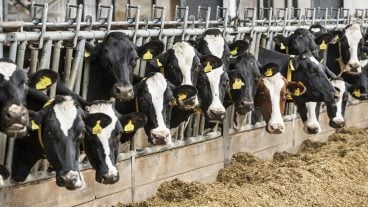
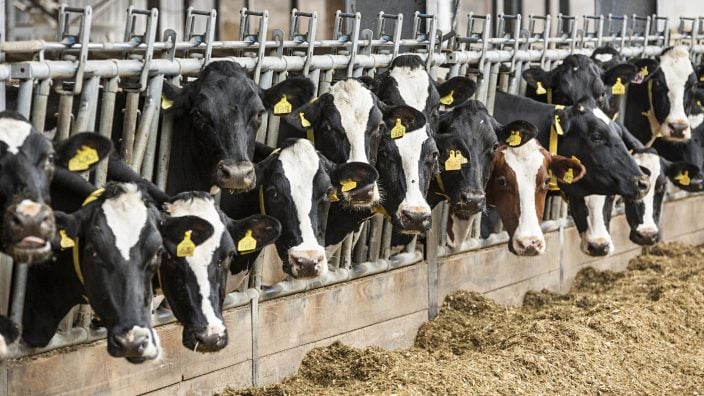
Producers are urged to work with their veterinarian to practice enhanced biosecurity measures and review and limit cattle movements within production systems.
Read More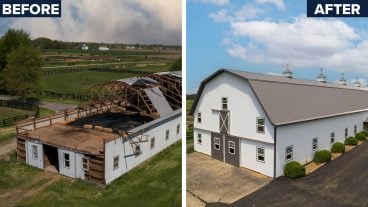
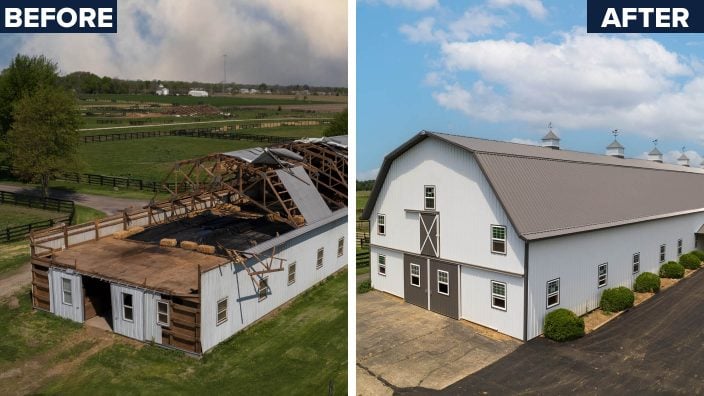
The changing seasons bring with them the need to thoroughly inspect pole barns for any damages that may have occurred during the winter months.
Read More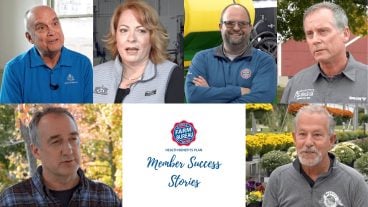
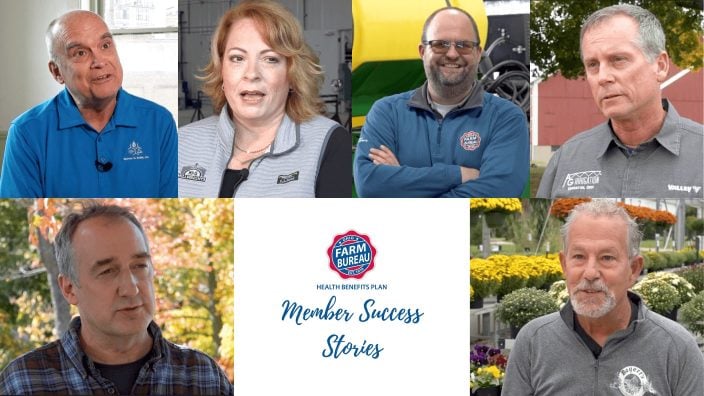
Hundreds of Ohio businesses and sole proprietors are raving about Ohio Farm Bureau’s Health Benefits plan with lower, predictable costs and easy enrollment and administration options.
Read More